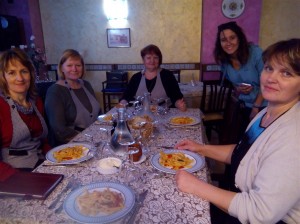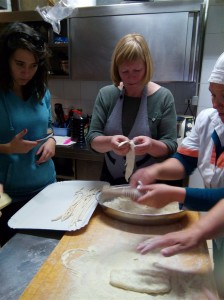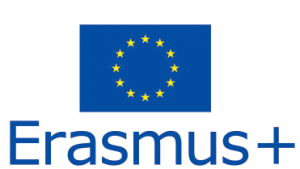Participants of the project “hub for the future” visit Italy

Within the framework of the Erasmus + project “hub for the future” (Contract No 2014-1-LV01-000218), a group of five Rēzekne municipality's educational specialists went through training and experience exchanges and a trip to Italy, an adult educational institution in the city of Celano, in a mountainous area about a half hours away from Rome.
The main purpose of the training was to explore the foundations of healthy lifestyles and the experience of family support in Italy, so that the mobility programme included both the dietetic and sociologist lectures, the masterclass under the direction of restaurant cheff, and the visit of the centre for youth centre and psychological support.
We found out in lectures what dietary habits in the area are, how to develop an understanding of a healthy lifestyle. The word “diet” means the correct style of life. The Mediterranean diet has been studied for 50-60 years and is included in THE UNESCO World Intangible Heritage List, as it is based on the use of the principles of sound food pyramid in daily life. The main ingredients of the Mediterranean diet are vegetables, fruit and fish. It was stressed that the use of a large number of animal fat is not recommended, but it is necessary to ensure the correct ratio of protein, carbohydrate and fat. You can listen to and read tips for sound, but it should be remembered that balanced diet should become a daily habit and that physical activity is also affected by human self-confidence.
In the sociologist lectures, “parental responsibility” dealt with the problems of modern families and their causes. Several years ago, the problem of communicating between teenagers and parents was less because one family model prevailed: parents – children, but there are now many small families, non-traditional families, and often children are raised by grandparents. Similarly, the rules, values, sometimes social identities have changed in society as a whole and in families.
According to Lecter, the family models are two ways:
- “Normal circle” where a woman and a man raise a child together. Both come from different families, and their traditions are combined, but there may sometimes be minor problems when creating a common life and raising children.
- “Problematic circle” where parents come from different cultures; where there are part-time or non-traditional families. Often, differences arise from the fact that they are unable to agree on which cultural traditions children will be raised. If problems begin between two parents, the grandparents often interfere and want to impose their own model – how to raise, educate. There are cases where problems arise in the family because they are “struggling” 4 models – mother, father, mother's parents and father parents. It is often the first crisis in the family, and if it is over, then later parents cooperate well.
 In the past, adolescents have been aged between 14 and 18 years, but adolescents are now aged up to 11 years and are up to 25-26 years of age, thus becoming more wide-ranging. This is due to socio-political changes, difficulties in finding jobs, resulting in young people staying in families longer, or sometimes parents do not want to “run” children away. Even if the family is working normally, there may be a critical point: parents move, lose their jobs, so that they do not start the crisis, emotions must be expressed, talk about the problem. The task of both parents and school is therefore to teach them how to communicate. Its child has a very important skill, as well as communication is the first step in tackling crisis situations.
In the past, adolescents have been aged between 14 and 18 years, but adolescents are now aged up to 11 years and are up to 25-26 years of age, thus becoming more wide-ranging. This is due to socio-political changes, difficulties in finding jobs, resulting in young people staying in families longer, or sometimes parents do not want to “run” children away. Even if the family is working normally, there may be a critical point: parents move, lose their jobs, so that they do not start the crisis, emotions must be expressed, talk about the problem. The task of both parents and school is therefore to teach them how to communicate. Its child has a very important skill, as well as communication is the first step in tackling crisis situations.
We visited the teenage and youth daily centre “Skabostik”, which is funded by the municipality and is visited by young people aged 12-28 in the afternoon. Young people have different tendencies to addiction, behavioural problems and/or unemployment, and there is no place to spend time in the evenings. The direction of the Centre: to teach young people to set and reach the target, schedule time. The Head of the Centre said that they are proud of the fact that some young people who visited the centre in the pre-beginning and spent time in musicisation now formed their own group, recorded songs and worked well for several years.
 If “Skabostik” specialists notice complex problems which can only be addressed by appropriate specialists, young people are sent to the Sipsia specialists. “Sipsia” is the only centre of psychological support in the Abruzzo region where the drug-dependent young people are working.
If “Skabostik” specialists notice complex problems which can only be addressed by appropriate specialists, young people are sent to the Sipsia specialists. “Sipsia” is the only centre of psychological support in the Abruzzo region where the drug-dependent young people are working.
By attending the psychological support centre Sipsia, we found that there was a number of organized etapos. The social assistant explains the family problem where living conditions are living. The psychologist, on the other hand, tests the problem and is followed by a meeting of experts to agree on the best way to do what will be done.
“Sipsia” is characterised by extensive cooperation involving both parents and various institutions: municipalities, police, hospitals, schools. It is also interesting to collaborate with universities because, after learning the theoretical course (4 years), a 1 year practice is mandatory for psychologists and sociology students, i.e. the real experience needed to work independently. Is a trainee who works with students and takes an exam after a year.
A convenient, informal environment is created for young people in both centres so that they can work, “open up” and discuss their problems.
The end of the visit is a very interesting and exciting masterpiece in the restaurant, because we - adults - like children are best remembered for what we do with our hands, feelings and taste. The training centre AMPHI had created a really exclusive opportunity to know the Mediterranean diet.
Iveta bridge, project coordinator
Ineta cross, member of the project team
